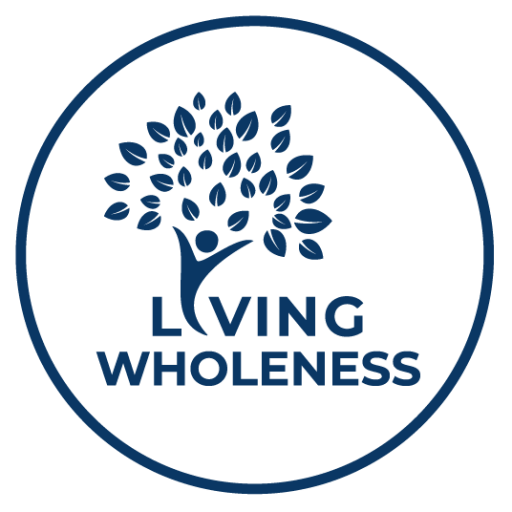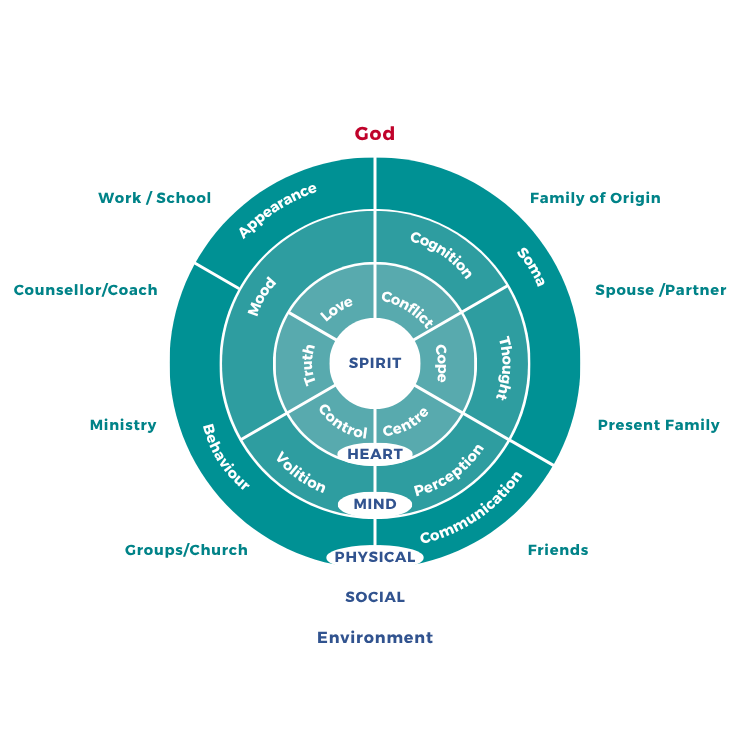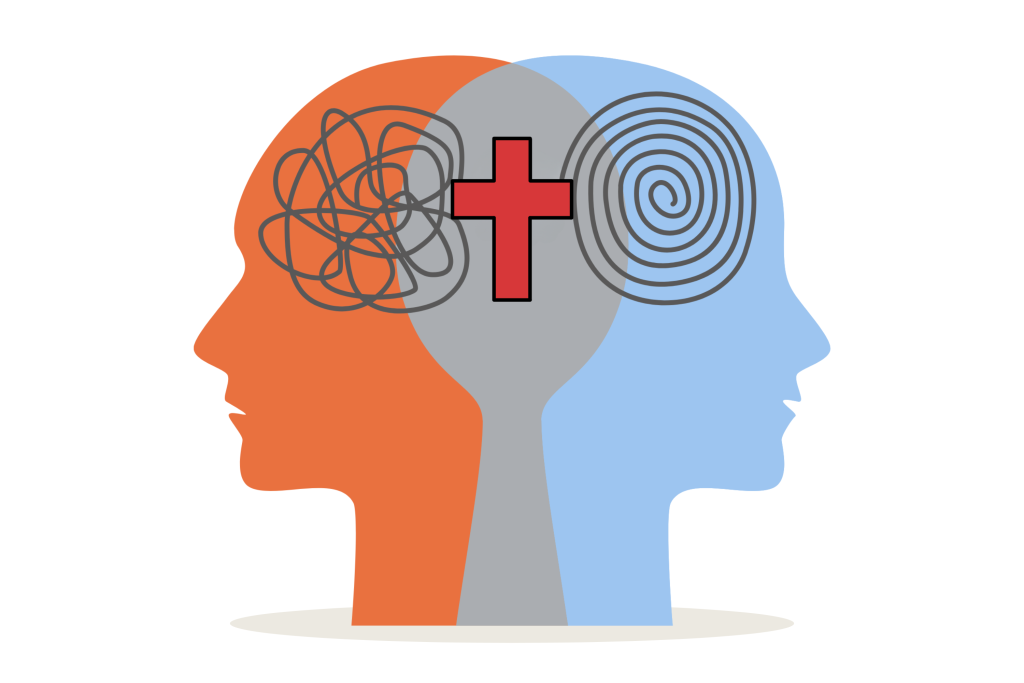A Reflection on the Application of Cognition in the Mind Circle within the Christian Wholeness Framework
By GeokCheng TAN
The Christian Wholeness Framework (CWF) by Dr. John Warlow is a deeply integrated model of how God relates to us and how we, in turn, can relate to ourselves, others, and God. Within the Mind Circle, the focus on cognition—our thoughts, perceptions, and beliefs—invites a journey of transformation through the renewing of our minds (Romans 12:2). While the CWF provides a clear structure, it is in the lived experience of reflection and application that its truth comes alive.
The Gift of Thought
In the CWF, the Mind Circle represents the realm of thinking, perceiving, remembering, and interpreting. It sits alongside the Heart (emotions and relationships) and the Will (decisions and actions). Yet, in my experience, cognition often acts as a quiet driver beneath both feeling and behavior. What I think about God, myself, and others profoundly influences how I feel and act.
In my recollection, there are moments in the past when my thoughts spiral into self-doubt or judgment, and I realize how easily the “old patterns” of thinking (Ephesians 4:22–23) can shape my reality. At such times, the Spirit gently invites me to notice my inner dialogue: What am I believing right now? Is it aligned with truth or colored by fear?
Reflection within the Mind Circle helps me to pause and realign my cognition with God’s truth rather than my distorted perceptions or beliefs.
Cognition, then, is not just an intellectual exercise—it is a spiritual act of turning toward truth. To think rightly is to participate in God’s renewing work, allowing His Word to reshape what I assume, value, and focus on.
The Transformation of Perspective – Seeing as God Sees
I often recall Jesus’ words in John 8:32: “You will know the truth, and the truth will set you free.” True freedom begins with right seeing—seeing as God sees. In counselling, many struggles trace back to distorted cognition that is expressed as feelings of unworthiness, false guilt, rigid perfectionism, or hopelessness. These thoughts, when unexamined, become strongholds (2 Corinthians 10:4–5).
We can help a person explore their Mind Circle by gently uncovering these thought patterns—not to shame or correct, but to bring them into light and truth. It means creating a safe space for awareness—“What is the story you are telling yourself?”—and inviting the person to consider God’s story instead.
I have found this especially powerful in my own walk. When I perceive God as distant or disappointed, my emotions follow that narrative with heaviness. But when I pause to remember who He is—compassionate, slow to anger, and abounding in steadfast love (Psalm 103:8)—my thoughts soften, peace follows, and faith rests on who God is and not what I think. Thus, cognition becomes a bridge toward intimacy, helping me to experience the truth of God’s character personally, not just intellectually.
Inner Dialogue
Cognition operates not only in reasoning but also in the quiet, constant self-talk that fills our minds. Hence, learning to have self-awareness of this internal conversation—how we interpret events and speak to ourselves—is essential.
For me, reflection often begins by naming the voice within: Is this the voice of the Shepherd or of the accuser? Jesus says, “My sheep hear my voice” (John 10:27). Yet, I often notice a harsh, critical tone that is not His. When I listen to that voice, it shapes my emotions and my sense of identity. The process of renewal begins when I identify these cognitive distortions and allow the truth of Scripture to reframe them.
For example, in moments of inadequacy, the Spirit reminds me: “My grace is sufficient for you, for my power is made perfect in weakness” (2 Corinthians 12:9). Holding this truth in my mind allows space for humility and rest. Cognition thus becomes an avenue for grace—choosing to think in alignment with God’s promises rather than my insecurities.
In counselling, this same awareness becomes a tool of empathy. When I notice how a person describes themselves or their situation, I listen for the underlying beliefs and perspectives. Cognitive awareness is not about correcting thoughts with logic but guiding the person to encounter truth in relationship—with God, with themselves, and with me as a compassionate presence.
Cognition, Emotion, and Will
In real life, thoughts never operate in isolation. The Mind Circle connects intimately with the Heart and the Will. For example, when I believe “I am not good enough,” that thought feeds feelings of shame (Heart) and may lead me to withdraw or overcompensate (Will).
Reflecting on cognition reminds me to slow down and trace these inner movements: What am I thinking? How does that make me feel? What does it lead me to do? This simple awareness allows space for transformation.
As I have journeyed with others, I notice that healing often begins not by addressing behavior directly but by exploring the thoughts beneath it. A person struggling with anger may discover underlying thoughts of fear or injustice. Someone facing despair may realize they believe “nothing will ever change.” In each case, truth gently spoken and held in love opens the way for new choices and emotions.
This integrative view is deeply biblical. Jesus consistently engaged people at the level of their thinking and belief: “What do you want me to do for you?” (Mark 10:51), “Why are you afraid?” (Matthew 8:26), “Do you believe that I am able to do this?” (Matthew 9:28). His questions invited reflection and realignment of cognition toward faith and trust. Applying this in counselling means following His example—helping others move from distorted perception to renewed understanding in relationship with Him.
Renewing Our Cognition
The application of cognition in the Mind Circle extends beyond counselling sessions into daily discipleship. Romans 12:2 calls believers to “be transformed by the renewal of your mind.” This is an ongoing process—daily choosing to let God reshape how I think, interpret, and remember.
Practically, I exercise the 3As, which I have found helpful:
- Awareness: Paying attention to what occupies my mind. When I feel anxious or heavy, I ask, What thought is driving this feeling? Awareness is the first step to change.
- Alignment: Bringing those thoughts before God in prayer. I often write them down and place them against Scripture: Is this true? Is this loving? Is this of God?
- Abiding: Replacing falsehood with truth through meditation on Scripture. Philippians 4:8 provides a compass—“Whatever is true, honorable, just, pure, lovely, commendable… think about these things.”
When I practice the 3As, I find that cognition becomes not merely a mental process but a form of worship—offering my thought life to God as part of loving Him with all my mind (Luke 10:27).
Renewing the Mind
While the theory of cognition may sound straightforward, its application is rarely easy. My own experience shows how stubborn old thought patterns can be—especially those rooted in early wounds or repeated narratives. There are times when I intellectually know God’s truth yet emotionally struggle to believe it.
Nonetheless, we must remind ourselves that transformation is relational, not mechanical. I do not change my thinking alone but in communion with Christ and others. When I share my struggles with trusted companions, they become mirrors of truth to me. Their presence helps me internalize God’s reality more deeply.
This humility—to admit my limited perspective and to seek truth in community—is itself part of renewing the mind. It reminds me that cognition is not about being “right” but about becoming more real before God.
Over time, I have noticed subtle shifts. I no longer rush to judge myself or others as quickly. When negative thoughts arise, I pause to ask, Is there another way to see this? This openness creates space for compassion and wisdom.
In ministry, a renewed mind helps me listen with discernment rather than reaction. When someone speaks in pain, I notice not only their words but also the underlying belief shaping their experience. I can then pray silently, “Lord, how do You see this person?” Allowing God’s perspective to inform my cognition changes how I respond—it softens, slows, and steadies me.
Ultimately, applying cognition in the Mind Circle is about participating in God’s restorative work. It is the movement from self-centered interpretation to God-centered perception. It is learning to “take every thought captive to obey Christ” (2 Corinthians 10:5), not through striving but through surrender.
The Mind Anchored in Christ
Reflecting on the application of cognition in the Mind Circle has deepened my appreciation for how tenderly God engages the human mind. He does not demand instant clarity but invites continual renewal. As I allow Him to reshape my thinking, I find greater peace, purpose, and presence.
In counselling and discipleship, this awareness helps me walk alongside others with gentleness, knowing that thought renewal is a process woven through relationship. We are all learning to see through God’s eyes, to interpret life through His truth, and to live from a mind anchored in Christ. Philippians 2:5 reminds us, “Let this mind be in you which was also in Christ Jesus.” That is the ultimate goal of the Mind Circle—to think, perceive, and understand as Jesus does. As I continue this journey, I hold onto the promise that “the mind governed by the Spirit is life and peace” (Romans 8:6). In that peace, both counsellor and counsellee can rest—renewed, restored, and made whole in Him.







